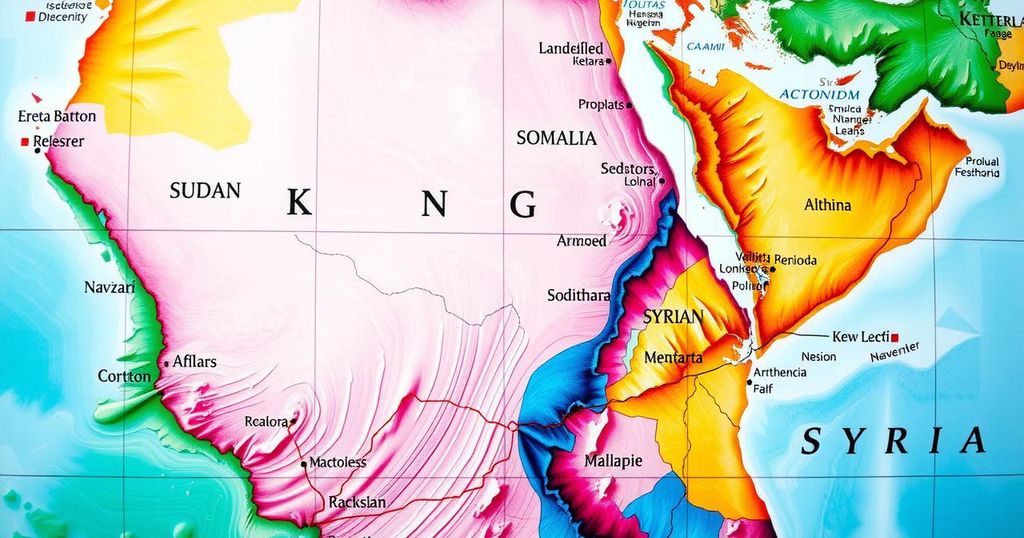U.S. and Israel Assess Options for Gazan Resettlement in Africa and Syria

The Trump administration and Israel have explored options to resettle Gazans in Sudan, Somalia, and Syria as part of a broader strategy to end the conflict with Hamas and rebuild Gaza. While officials emphasize that this is not a forced expulsion, the proposal has faced significant backlash from Arab nations and humanitarian advocates who raise concerns about ethnic cleansing and the dire situational realities in proposed host countries.
Recent reports indicate that the Trump administration and Israel have explored options for resettling Palestinians from Gaza in countries such as Sudan, Somalia, and Syria. This initiative is a part of President Trump’s broader strategy to end the ongoing conflict between Israel and Hamas, with aims to rebuild the devastated areas in Gaza. The idea of relocating Palestinians is among several proposals under consideration as the administration seeks alternatives to ongoing violence in the region.
President Trump has asserted that there will be no mandatory expulsion of Palestinians from Gaza, stating during a meeting with the Irish Prime Minister that he never intended to suggest such a course of action. He emphasized the potential for Gaza to become a prosperous region, referring to it as the “Riviera of the Middle East”. Moreover, Trump mentioned that resettlement would involve the cooperation of other nations with humanitarian intentions.
Communication regarding this resettlement initiative has reportedly occurred between U.S. and Israeli officials and the governments of Sudan and Somalia. However, Dahir Hassan, the Somali ambassador to the U.S., denied any official approach from either government regarding relocating Palestinians. Additionally, discussions with Syria’s interim government have reportedly taken place, although the extent of their response remains unclear.
The situation in these countries complicates resettlement prospects. Sudan is facing internal civil unrest and a refugee crisis, while Somalia remains fragile due to ongoing threats from extremist groups. Meanwhile, Syria’s new leadership has denounced Trump’s remarks, viewing them as detrimental and politically motivated. Advocacy groups urge the administration to engage directly with the new Syrian government to stabilize the region.
The humanitarian crisis in Gaza remains dire, with significant destruction reported in infrastructure and a staggering death toll. In light of this, many Arab nations and humanitarian organizations oppose Trump’s resettlement plans, vocalizing concerns over potential ethnic cleansing. Conversely, Trump has suggested that relocating Palestinians might be necessary as Gaza is deemed uninhabitable under current conditions.
Efforts to coordinate resettlement have sparked heated debates within political circles, with some Israeli officials advocating for the movement of Palestinians from both Gaza and the West Bank. Nonetheless, the U.S. State Department has deferred questions on this topic to the Israeli government, indicating no formal policy declarations regarding the overall plan.
In conclusion, while the notion of resettling Gazans in Sudan, Somalia, and Syria emerges as part of broader peace efforts, the complexities surrounding these countries render the feasibility of such plans uncertain. Continued dialogue among local governments, humanitarian organizations, and international stakeholders is crucial to address the humanitarian plight of Palestinians and ensure a comprehensive strategy for peace in the region.
The potential resettlement of Palestinians from Gaza has become a contentious issue among U.S. and Israeli officials, particularly in regard to proposed locations such as Sudan, Somalia, and Syria. The idea has elicited strong reactions both internationally and locally, underscoring the humanitarian crises and political complexities involved. As discussions surrounding deployment persist, it is imperative that all stakeholders engage responsibly to address the needs and rights of displaced individuals in this context.
Original Source: www.cbsnews.com








